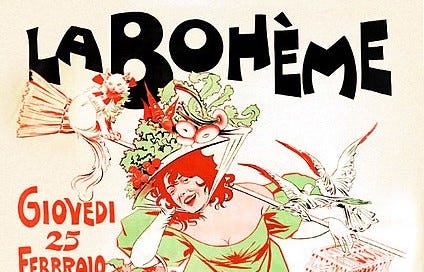The death of Mimì — and culture
Why can't we pay the vast majority our creative types enough to stay alive?
If you like the opera, or have a spouse who does, chances are you’ve seen a few productions of “La Bohème.”
Giacomo Puccini’s 1896 classic is, according to the data website Operabase, the fourth most frequently performed opera in the world, after Wolfgang Mozart’s “The Magic Flute,” Giuseppe Verdi’s “La Traviata” and Georges Bizet’s “Carmen.”
I never understood why Puccini’s simple love story was among those arguably deeper, more complex works until I saw a recent production by the highly professional Berkshire Opera Festival in Pittsfield, Mass.
Even in the hands of a lesser company, “La Boheme” packs a powerful emotional punch. When the ailing Mimì (Grammy-nominated Whitney Morrison) launched her brief farewell aria, there was hardly a dry eye in the house. Surely not mine, even though I’ve heard that goodbye many times.
And for the first, I realized that “La Bohème” is about today’s America.
The opera follows a group of young, creative, bohemian types (hence the title) living — and loving — in late-1800s Paris. Which, at the time, was a cauldron of cultural innovation.
French painters were moving from Post-Impressionism toward Symbolism, Expressionism and parts unknown. French writers were discovering modernism and social justice. Inventive French composers like Ravel, Debussy and Berlioz were grabbing the world by the ear.
It was also the golden age of opera, that magical melding of song and drama. Operabase’s 50-most-performed list is, aside from Mozart (d. 1791), dominated by late-19th century composers.
Paris back then was also a cauldron of misery. Puccini’s young artists were, like many citizens, quite literally starving — even as a new Belle Epoch aristocracy of commerce and finance was parading its wealth on the boulevards.
A bit like today’s America. Our country has the worst economic inequality among the world’s wealthy democracies, and our billionaires know how to flaunt it.
Nearly half of workers here don’t make enough to afford a one-bedroom apartment in most major cities. Roughly 15% of families don’t always have enough to eat. Meanwhile, the U.S. is the only rich country in the world without universal health care.
France, too, lacked even a basic social safety net in the “La Bohème” era, but reformist governments fixed all that some decades later. In today’s Paris, freelance culture makers receive subsidies, and all workers can retire at age 62 with pensions. Mimi’s tuberculosis would get treated — for free.
I also saw something less obvious on that stage, a subtext I’d missed before. The artists and writers of the “La Bohème” era were poor not because they lacked talent or gumption, but because they couldn’t earn much for their work. Even real-life masters like Georges Braque, Fernand Léger and, legend has it, Pablo Picasso were reduced to bartering paintings for meals. Vincent Van Gogh died penniless.
Much the same for writers. The late-19th century was a time of weak copyright laws, miserable royalties and barbaric freelance rates. Henri Murger, who wrote the book that inspired “La Bohème,” also died broke.
Things have changed in the U.S., though not much. Sure, celebrities do just fine. And The Bureau of Labor Statistics says graphic artists now make an average of $50,000 a year. But only if they are employed full-time for, say, an advertising agency or an animation studio. Self-employed painters and sculptors like the ones in “La Bohème” and throughout the U.S.? Still struggling.
The median full-time American writer, according to the Authors Guild, earns a little more than $21,000 a year. (Try living on that.) Meanwhile, Americans are buying fewer books, magazines and newspapers. (The Internet offers such stuff for free.)
Even Hollywood’s writers — joined by its actors — have gone on strike. They’re getting squeezed by the big studios, deprived of streaming royalties, threatened by artificial intelligence’s ability to generate endless images and scripts.
If this country doesn’t start paying its artists, writers, actors, dancers, musicians and other creative workers enough to live on, then serious culture in America will shrivel and die — along with American civilization. Tomorrow’s Shakespeares, Van Goghs and Puccinis will go into finance instead.
What can we do? Support the bipartisan proposal in Congress for a new Federal Writers Project, modeled on the one that helped keep literature alive during the Great Depression. A version to support the other arts could emerge soon.
Also, buy more books and periodicals. Attend more plays, concerts, recitals and movies (in a theater). Oh, and catch a performance of “La Bohème.”
That would be a good opportunity to ponder the hardships of creativity and the troubled future of American culture. You won’t leave dry-eyed.



Many thanks, Paul. Let's also hope the EU endures and retirement at 64 isn't followed by too many other setbacks for the social safety net.
Thanks, Meredith. Hope to be back to NYC toward the end of the year. See you then.